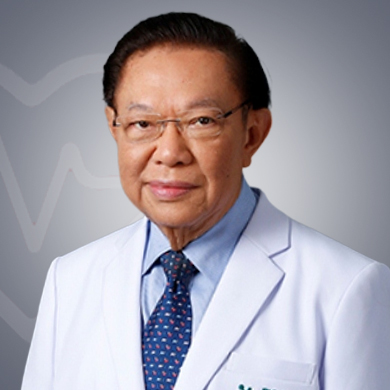
0 Years of experience
Speaks: English
Dr.Narong Dusitanond currently works in the neurological center of Phyathai 2 Hospital, 943 Phaholyothin Road, Phyathai, Phyathai, Bangkok 10400. He specializes in Neurosurgery. The term “neurosurgery” is short for neurological surgery, a discipline that is concerned with the diagnosis and treatment of nervous system disorders. Neurosurgery is a sister discipline to neuro medicine, which involves the diagnosis and treatment of neurological disorders and complications using medications and non-surgical methods. In most patients, neurologists (who deal with neuro medicine) work alongside neurosurgeons. Dr. Dusitanond has previously worked as Neurosurgeon, in Somdet Chaopraya Hospital, Thailand, (1968-1972).
A neurosurgeon is a medical specialist who diagnoses and treats conditions affecting the nervous system, including the brain, peripheral nerves, spinal cord, and spine. Neurosurgeons offer non-operative as well as surgical treatment to patients. Here is a list of some of the conditions Dr. Narong Dusitanond treats:
In case your body shows any of the below-given symptoms, go and see a neurosurgeon who will help diagnose the underlying conditions. Some conditions may be mild while others may require immediate attention. Proper diagnosis on time can prevent serious conditions.
Neurologic symptoms are generally caused by a disorder that affects the nervous system and could vary greatly as the nervous system controls many various body functions. Symptoms can be all forms of pain and can involve muscle function, the special senses, sleep, awareness, and mental function.
You can find Doctor Narong Dusitanond in the clinic/hospital from 11 am to 5 pm (Monday to Saturday). The doctor is not available on Sunday. You should confirm the doctor’s availability you visit him. This is because, sometimes, the doctor is out of the station or might be occupied in some emergencies.
The popular procedures that Dr. Narong Dusitanond performs are listed below:
One of the eminent neurosurgeons in the world, Dr. Narong Dusitanond has specialized in the surgical treatment of diseases of the nervous system. The doctor works with a team of highly experienced physicians and can handle even the most complex with quite an ease. The neurosurgeon follows all medical protocols to ensure patient safety.

Share Your Experience about Dr. Narong Dusitanond

A neurosurgeon is a doctor who specializes in the diagnosis and surgical treatments of conditions of the central as well as the peripheral nervous system. A neurosurgeon completes special training after becoming a doctor, including one year of residency in general surgery and a few more years of residency in neurosurgery. Some neurosurgeons complete fellowship training, which is additional training to further enhance their focus within the field of neurosurgery. Neurosurgeons work in different settings like private clinics and public or private hospitals. They often collaborate with other specialists and medical professionals as per the requirement of surgery. They also evaluate the condition of the patient before performing surgery in order to find the complications of the surgery, if any.
A neurosurgeon will recommend you one or more diagnostic tests before and during consultation in order to find out the case of the condition and start the right treatment. A neurological examination may include the following:
Some of the diagnostic tests required before and during a consultation with a neurosurgeon are::
Here are some of the common signs that you must seek the medical assistance of a neurosurgeon:
Neurosurgeons perform complicated operations on the brain. Also, they deal with the whole nervous system and treat all the body parts that are affected by nerve issues. Typically, a neurosurgeon will diagnose patients' symptoms and come up with minimally invasive treatment plans.